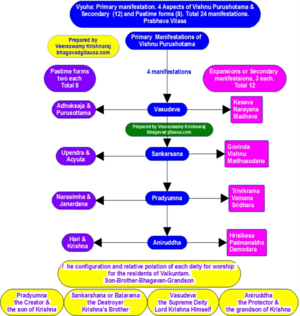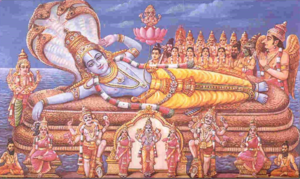Talk:The Vyūha Doctrine of Pāṅcharātra Vaishnavism
By Sri Vishal Agarwal
According to Pāñcarātra theology, Bhagavān is described in five distinct forms.[1]
- Para (the transcendent): This form possesses the six attributes denoted by the word Bhagavān — knowledge (jñāna), lordship (aiśvarya), potency (śakti), strength (bala), virility (vīrya), and splendor (tejas).
- Vyūha (the grouped forms): These are four emanations named after Kṛṣṇa, His elder brother, His son, and His grandson:
- Vāsudeva – identical with the Para form.
- Saṅkarṣaṇa – associated with the embryonic stage of creation, and with the teaching of devotion to Vāsudeva. Sometimes identified with Śiva.
- Pradyumna – associated with the manifestation of the duality of Puruṣa and Prakṛti.
- Aniruddha – associated with enabling the growth of body and soul.
- Vibhava (incarnated forms or avatāras such as Rāma, Kṛṣṇa, etc.).
- Antaryāmin (the immanent form).
- Arcā (the mūrti or image, considered the most concrete form).
Among these, the fourfold Vyūha doctrine of the Pāñcarātra has been contested by other traditions. It is often illustrated through diagrams.
Analogy of Water
Pillai Lokācārya, a Śrī Vaiṣṇava theologian, explains the five forms through an analogy of water:[2]
The attempt to comprehend the transcendent form is like getting water from another world for quenching thirst. The Vyūha form is like the legendary ocean of milk, not easily accessible. The immanent form is like subterranean water, right beneath one’s feet but difficult to reach. The incarnated forms are like floods that inundate the land briefly but do not last long. The arcā is like a stagnant pool, accessible to all at any time.
The Eternal Form of Viṣṇu
Parallel to the doctrine that the Para form possesses six positive attributes, Pāñcarātra texts also describe Parabrahman as having a personal, immutable form composed of śuddha-sattva. This form, often depicted as Viṣṇu reclining on the serpent Śeṣanāga, is said to survive cosmic dissolution. His attendants are also described as possessing indestructible bodies of the same substance.
The Viśiṣṭādvaita Vedānta system, developed by Śrī Rāmānuja (1017–1137 CE), elaborated upon this concept. Although he affirmed that the finite selves and the universe constitute the body of Bhagavān, Rāmānuja also emphasized that Bhagavān has an eternal, independent body — one free of imperfection and possessing infinite brilliance and splendor.
Rāmānuja provided four reasons for affirming this form:
- Scriptural texts directly state that Bhagavān possesses a supernatural form, which should be interpreted literally.
- Acceptance of this form reconciles seemingly conflicting scriptural passages, including those that ascribe material enjoyments to Bhagavān.
- He appealed to authorities such as Bādarāyaṇa, Ācārya Taṅka, and Drāmiḍācārya, who also affirmed the existence of a divine form.
- The doctrine fits with the theological principle that Bhagavān, as an ocean of compassion, manifests in a form attractive to devotees.
Although this teaching may appear redundant, given that the universe and selves are also regarded as His body, Rāmānuja justified it through scripture and theology. Later exponents such as Śrī Veṅkaṭanātha (Vedānta Deśika) further elaborated on these themes.
Accessibility of the Divine Form
Rāmānuja emphasized that although the divine form cannot be perceived by ordinary senses, its beauty attracts devotees, and Bhagavān reveals it to them through His grace. This perspective integrates Pāñcarātra and Bhāgavata traditions with the Vedāntic conception of Brahman, leading to the designation of Viśiṣṭādvaita Vedānta as Ubhaya-vedānta (the twofold Vedānta).
The Meaning of Śrī
According to Śrī Vedānta Deśika, the word Śrī may be derived in six ways, each signifying an aspect of the goddess:
- From śriyate – She who is resorted to by devotees.
- From śrayate – She who resorts to Viṣṇu.
- From śṛṇoti – She who listens to worshippers.
- From śrāvayati – She who makes Viṣṇu listen.
- From śṛṇāti – She who removes defects and obstacles preventing liberation.
- From śṛṇāti – She who perfects beings so that they may attain mokṣa.


